Consummate rocker goes one-on-one with FBPO’s Jon Liebman, covering the gigs, the tours, equipment and more!
Exclusive interview with FBPO’s Jon Liebman
January 31, 2011
Originally from Buffalo, New York, Billy Sheehan is best known for his bass playing with Talas, Steve Vai, David Lee Roth, Mr. Big and Niacin. Billy has earned numerous awards and distinctions for his bass playing, including multiple readers’ polls from Guitar Player magazine, which also inducted him into its “Gallery of Greats.”
Sheehan’s acclaim as a bass player extends to all points across the globe, including Japan, where Billy has won the prestigious Player Magazine readers poll for Best Bass Player an unprecedented 14 consecutive times, as well as Burrn! Magazine’s Readers Poll five times. With his signature chording, two-handed tapping, right hand “three-finger picking” technique and controlled feedback, Billy Sheehan is said to be responsible for changing the way the bass is played today.
FBPO: What kind of musical upbringing did you have?
BS: Nobody in my family was musical, but my Dad was a “recitationist.” That is, he would “recite” stories, poems and scenarios. It’s an Irish “gift of gab” thing. So, he was an entertainer, a storyteller. My Mom was way into music as a fan of Sinatra and all the ’40s artists and big bands. I rebelled against it initially, but now I’m a huge fan of that music. I had older sisters and an older brother, so I got turned on to music that was ahead of me in years, like the Everly Brothers and Jerry Lee Lewis, plus tons of soul and R&B (old school) and, of course, the Beatles and all the British Invasion bands.
FBPO: How did you end up as a bass player?
BS: A friend around the corner, Joe Hesse, was (is) a bass player. Older than I, he hung out with my older siblings. He was the coolest guy in the neighborhood and I wanted to be like him. We’re still best friends to this day and he’s still an awesome player. His band rehearsed in his basement and I sat outside listening. I loved bass from the very beginning of my understanding and awareness of music.
FBPO: How do you think growing up in Buffalo affected you, musically?
BS: It was my luckiest break, being born in Buffalo and growing up there in the ’50s, ’60s, ’70s and ’80s. The music scene was hot and smoking, with bands playing everywhere, every night of the week. It was all about performing live. It was all about filling up a room with people who wanted to dance and/or listen.
I learned most of the important things about music — performing, songwriting, singing and the “biz” in general — along with a million other invaluable things, by playing live so much for so long. Priceless. The stories I can tell. It was amazing! I was lucky to fall in with some spectacular talent that influenced me much more than I realized at the time. The guys in Talas for sure, and lots of others. Buffalo was packed with extraordinary players and dozens of great bands.
FBPO: How would you describe your technique? To me, it looks like you play from your gut and your heart, rather than in a conventional sense. At the same time, though, your lines can be awfully complex, technically!
BS: Well, taking into consideration the answer to your previous question, performing live was an essential element to everything I do. And, thanks, by the way! Very kind of you to say that, Jon.
I’m a music fan, music freak, aficionado and more. I love to listen as well as play. My iTunes collection is up to 67,771 songs with 340+ gigabytes and more to come, I’m sure. It’s a very focused collection, too. It all affects me, always very positively. When things get difficult or when musical lines challenge me with complexity, I get excited and go for it, no matter what. In my mind, nothing is impossible, so I throw myself at the tough stuff with no reservation. In the end, though, it has to be musically useful on stage, in front of people. That’s especially the case for non-musicians. That is, the audience in general. They are the ones we play for.
So 40+ years of fine-tuning all that — with much more to go! — has led me to where I am today. In the early days, there was nobody saying, “You can’t do that” to me, so I knew no better. I learned music of all kinds, from many different instruments, on the bass: the Bach Brandenberg Concertos, Debussy, Oscar Peterson, Paco DeLucia and more. I covered quite a wide range. I also tried to imitate Tim Bogert, Paul McCartney and Paul Samwell-Smith, along with many, many others. All that eventually melted into my own style. Playing live all the time had more to do with my development than anything else, I believe. The “real world” is up on stage, as far as musicians are concerned, in my humble opinion.
FBPO: How did the David Lee Roth gig come about? Was that the band that first elevated your stature as a world-class bass player?
BS: It certainly was my biggest break. Thanks, Dave! He was awesome and is still my hero. My band from Buffalo, Talas, opened for about forty Van Halen shows in 1980. I stayed in touch with Eddie a little, but in ’85 I got a call from Dave. He wanted to start a band with me. I was utterly blown away! I suggested Steve Vai for guitar and, thankfully, Dave agreed. We found Greg Bissonette to play drums and went at it. It was an absolute blast! The “hang” was one of the coolest things about it. We would sit around and tell war stories for hours, have a few drinks, do side-splitting comedy, and, oh yeah, play a little too! I’m forever grateful to Dave, as well as Steve, Greg and Brett Tuggle, the keyboard player, for some of the greatest adventures ever experienced by anyone.
FBPO: After doing all those worldwide tours with Roth, Vai and your own groups, you must have at least one really great “road story” you can share!
BS: I have hundreds! But, you gotta sit down with me in private and we must pop a few corks to get them rolling. Remember the thing about my Dad? The storyteller? I got it from him. My stories are “performance art” (I hope!) and are delivered best live in front of open eyes and ears. Some are a little “X-rated,” but never disrespectful. Some names are named when it’s just plain funny. Other times, the names are not mentioned if the story shows them in a bad light.
Just recently, in fact, I was in the studio while dUg Pinnick sang (absolutely awesomely!) a Sinatra song I played bass on, for an upcoming “Sin-atra” record. We hung out and told stories for hours. What a blast! On the tour buses after a show, on a long drive, with some vino, the stories come hot and heavy. Legendary tales. Mind-blowing and completely unbelievable details of the inner workings of the biz, touring, all peripheral activities, and much, much more. We laugh till our faces hurt. And the greatest thing? It’s all true!
FBPO: I had the privilege of seeing you play with Jeff Berlin and Stu Hamm at the Magic Bag just outside Detroit during your most recent BX3 tour. How would you compare BX3 to the SMV trio with Stanley Clarke, Marcus Miller and Victor Wooten? Or, for that matter, a trio of upright players, like that of John Clayton, Christian McBride and Rodney Whitaker, who played at the Detroit Jazz Festival recently?
BS: Playing with Stu and Jeff was such a privilege for me! We had a wonderful time and the stories, like the others I referred to, were as good as it gets. Compared to Victor’s tour with Stanley and Marcus? Not sure. They are all so awesome and in such unique ways. Bass players generally get along pretty well. Better than guitar players – trust me! [Laughs] It’s wonderful to see three bassists of any ilk or genre get together. I wish we could all do it together sometime. How about BX9! Or BX45! Or SMVSJBJCR!
FBPO: Tell me a little bit about your equipment. You’re not really an “off the shelf” kind of guy when it comes to that stuff, are you?
BS: I use my Pearce preamp in a rack with Ashly Audio compression for almost all my live shows. I’m very sad about having to leave Ampeg recently. Thankfully, Larry Hartke was in touch and offered his gear for me to try. I’m still doing some tweaking, but it’s rock solid and completely reliable. Plus, Larry’s name is on the amp, so I know that someone is responsible. He sees to it that everything that comes out of a factory with his name on it is supremely together. I did my first tour with it when I recently played with Eddie Jobson. I had to play a lot of John Wetton bass stuff. John, by the way, is one of the guys who I blatantly stole so much of my tone from! And the Hartke amps killed on it! That was before I did any deal with them. After that, they were kind enough to let me endorse their stuff and I’m very happy about it. I make no money from endorsing anything. Wouldn’t it be amazing if they paid us? Jeez – can you imagine?! Anyway, my basses are from the Yamaha factory. They are not custom shop versions. I tweak them out, but they are the same as the ones hanging on the walls at the music shops.
I have, from a very early age, been a “gearhead,” beyond reason and good sense. I dare say I may have been one of the first to use a rack for stage gear. We used Bud racks before Anvil. Nineteen-inch metal racks and a lot of Pro-Audio stuff for bass. I had custom preamps in the very early ’70s and worked closely with audio engineers for decades, tweaking, inventing and modifying gear. I had BGW power amps, all JBL speakers and cabs, Pro-Audio compression and crossovers, as well as the original H910 Harmonizer with a CV Keyboard! Ha! My rack was seven feet tall!
I simplified things later, of course, but many great lessons were learned that assist me to this day. I troubleshoot and build most every system I’ve ever used. I came up in a time when there was no road crew or “tech.” You had to do it all yourself. If something broke down, you either had to figure it out or go home with no gig and no pay. Many solder burns, electric shocks and chipped teeth from stripping wire while the people stared at me from the dance floor led to a deep understanding of learning to “Make it work. Now!”
FBPO: It’s great to see Mr. Big back together again. What’s happening with that band?
BS: We recently finished the new CD, produced by Kevin Shirley. It’s a heavy record. We wrote like we used to. We had a blast hanging out. I mean, if it ain’t enjoyable, why do it? I love the band, everyone in it and our manager. I’m very, very thankful we got a chance to play together, and sing together again. The new record is called What If…
FBPO: What else would you like to accomplish in your career that you haven’t done yet?
BS: I have two continents I haven’t performed on yet, and I haven’t done a solo show yet either. I was never much into the solo act thing. I’ve always been a band guy, but it might be cool, especially with some other players who I admire. Much more to go. Much more to learn. Every single time I sit down with my bass and go at it, I discover some new thing. Every time. It’s amazing. Thankfully, it never ends! I must get better. That doesn’t mean “faster,” by any means. It just means better. I’m working at it full time, more than ever. What else is there but music! And bass? It’s the coolest instrument there is!
FBPO: What do you like to do that’s not necessarily musically oriented?
Not much! [Laughs] I’m very interested in politics, philosophy, language, science, astronomy, geology, paleontology and more. But music is my all and my everything. It is the greatest art form. I am so lucky to make a living at it. Supremely lucky and forever grateful. We are artists. Isn’t that cool? From the simplest root note timekeeper to the wildest, whacked out blazing shred freak and all points in-between, artists all. Amazing. More bass!
Related posts:
[table id=345 /]
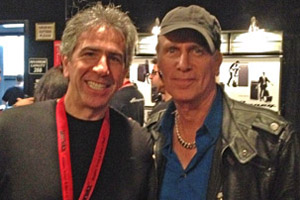


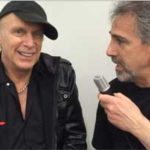
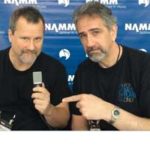
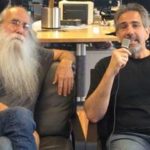

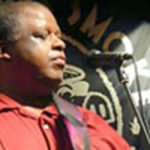

Bill was a big hearted person person don’t tell him I said that. I played in rival bands in Talas days warming up for them. He was so technically involved, love him to death, many stories.